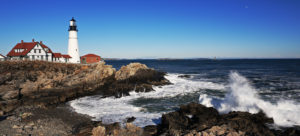This month we travel up the eastern seaboard to the Pine Tree State of Maine. Maine is the northeasternmost state in the contiguous United States. It is known for its jagged rocky coastline, low, rolling mountains, heavily forested interior, picturesque waterways, and its seafood cuisine, especially clams and lobster.
Maine was part of the Commonwealth of Massachusetts until 1820 when it voted to secede from Massachusetts to become a separate state. There is no definitive explanation for the origin of the name “Maine,” but the most likely explanation is that early settlers named it after the former province of Maine in France.
Carved by glaciers, Somes sound in Maine is considered to be the only fjord on the eastern seaboard and reaches depths of 175 feet. The extreme depth and deep drop-off allow large ships to navigate almost the entire length of the sound. These features also have made it attractive for boat builders, such as the prestigious Hinkley Yachts.
Business Climate
Maine’s agricultural outputs include poultry, eggs, dairy products, cattle, wild blueberries, apples, maple syrup, and maple sugar. Commercial fishing, once a mainstay of the state’s economy, maintains a presence, particularly lobstering and groundfishing. Western Maine aquifers and springs are a major source of bottled water. Maine is the number one producer of low-bush blueberries in the nation.
Tourism and outdoor recreation play a major and increasingly important role in Maine’s economy. The state is a popular destination for sport hunting (particularly deer, moose, and bear), sport fishing, snowmobiling, skiing, boating, camping and hiking.
Maine has a longstanding tradition of being home to many family owned shipbuilding companies. In the 18th and 19th centuries, these shipyards produced wooden sailing ships for transoceanic transport of passengers and cargo. Prominent and successful shipbuilding families in this early era were the Pennells, Skolfields and Morses who collectively made up a sizeable portion of the economy.
Tax Climate
Maine’s top individual income tax rate in the state is 7.15%. The top corporate income tax rate is 8.93%.
Apportionment: Maine taxpayers apportion income using a single-sales factor formula.
In Maine, receipts from services are sourced based on the location of the taxpayer’s market for the service.
Sales Tax Structure
The state sales tax rate is 5.5%, which ranks 29th in the nation. The state does not collect sales tax at the local level as many others do.
Sellers who lack physical presence nexus in Maine and have sales into the state that exceed $100,000 or 200 transactions for the current or previous calendar year must register and remit sales tax to the state. Gross sales of tangible personal property and taxable services are included in the threshold. Exempt sales are included in the threshold, but exempt services are not included in the threshold. This legislation went into effect on July 1, 2018.
A marketplace facilitator that has economic nexus with Maine must collect and remit tax on all marketplace sales for delivery into the state. Marketplace facilitators should include all sales made through the platform when calculating the economic nexus threshold (more than $100,000 in sales or at least 200 transactions of tangible personal property, electronically transferred property, or taxable services in the state). This law went into effect on October 1, 2019.
Maine is moderate in its approach to the taxation of technology products for sales tax purposes. Digital books, audio works and audio visual works in Maine are subject to sales tax. However, digital magazines and newspapers are exempt from sales tax. Prewritten software that is electronically downloaded is taxable while custom software that is electronically downloaded is exempt. Software-as-a-Service is also exempt from taxation. How products are produced, sold and delivered is critical to determining its tax status.
Many states have annual sales tax holidays, during which certain items the state wants to promote the purchase of (like school supplies, emergency preparedness supplies, or energy efficient appliances) can be purchased sales tax free. Maine, however, does not currently have any scheduled sales tax holidays.
Our team at Miles Consulting Group is always available to discuss the specifics of your situation, whether in Maine or other U.S. States, and help you navigate the complex tax structures arising from multistate operations. Call us to help you achieve the best tax efficiencies.
Random Facts
- It is the least densely populated state east of the Mississippi River.
- Maine’s Moosehead Lake is the largest lake wholly in New England, as Lake Champlain is located between Vermont, New York and Quebec.
- Eastport is the most eastern city in the United States.
- Maine is the only state in the United States whose name has one syllable.
- Maine is the only state that shares its border with only one other state.
- Portland is the birthplace of poet Henry Wadsworth Longfellow.
- Maine has fewer days of thunderstorms than any other state east of the Rockies, with most of the state averaging less than 20 days of thunderstorms a year.
- It has the most forest cover of any U.S. State with 83% of the state’s land covered by forests.
- Joshua Chamberlain, who was one of the heros of the battle of Gettysburg, was a college professor and governor of Maine. He was the last Civil War veteran to die as a result of wounds from the war and considered by some to be the last casualty of the war. The village of Chamberlain in the town of Bristol is named for him.




















